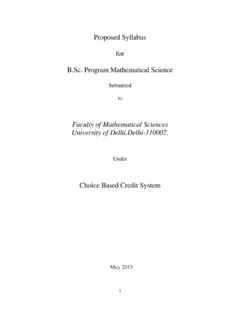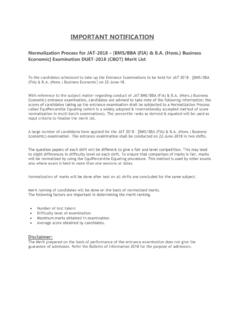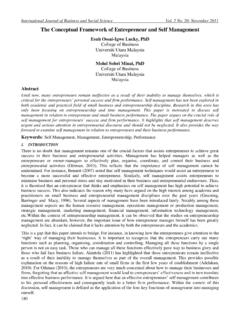Transcription of Bachelor of Commerce (Honours) B Com (Hons.) (Effective ...
1 (Hons) CBCS Department of Commerce , University of Delhi .. UNIVERSITY OF DELHI. Bachelor of Commerce (Honours). B Com (Hons.). (Effective from Academic Year 2019-20). Revised Syllabus as approved by Academic Council Date: No: Executive Council Date: No: Applicable for students registered with Regular Colleges, Non Collegiate Women's Education Board and School of Open Learning 1. (Hons) CBCS Department of Commerce , University of Delhi LIST OF CONTENTS. Content Page No. Preamble 3. 1 Introduction to Programme 4. 2 Learning Outcome-based Curriculum framework 4. in Programme (Hons.)
2 Nature and Extent of the Programme in (Hons.). Aims of Bachelor Degree Programme in (Hons.). 3 Graduate Attributes in (Hons.) 4-6. 4 Qualification Descriptors for Graduates 6. (Hons.). 5 Programme Learning Outcomes for in 6-7. (Hons.). 6 Structure of in (Hons.). Credit Distribution for (Hons.) 8. Semester-wise Distribution of Courses 9-11. 7 Courses for Programme (Hons.) 12-136. Course Learning Objective Course Learning Outcomes Course Teaching-Learning Process Assessment Methods Keywords 2. (Hons) CBCS Department of Commerce , University of Delhi Preamble The objective of any programme at a Higher Education Institution is to create for its students a sound foundation for their character development which directly contributes to the well-being of a nation.
3 The University of Delhi envisions all its programmes in the spirit of its motto which is to inspire the youth to show steadfastness and devotion in a fearless pursuit of truth. The LOCF aims at preparing young minds for constructive and productive character development by honing their creative and humanistic skills for their own betterment as well as for the greater good of the society. In order to provide an opportunity to students to discover a method of thinking which will help them realise their true potential, the University offers a Learning Outcome-based Curriculum framework (LOCF) for all its Under Graduate programmes.
4 The LOCF approach is intended to provide focused, outcome-based syllabi at the undergraduate level with an agenda to structure the teaching-learning experiences in a more student-centric manner by making the courses flexible and by offering students more choices. The LOCF. approach has been adopted to strengthen the teacher- learner interaction as students engage themselves in programmes of their choice and learn to realise their inner calling. As the Under- Graduate Programmes focus on preparing minds', they will create individuals who will have intellectual prowess, interactive competence, courage to lead the world and also compassion and empathy for fellow human beings.
5 The LOCF thus aims at strengthening not merely students'. employability skills but also at imparting to them vital life-skills required to lead a happy personal and social life. Each programme vividly elaborates its nature and promises the outcomes that are to be accomplished by studying the courses. The programmes also state the attributes that they offer to inculcate at the graduation level. The graduate attributes encompass values related to students'. well-being, emotional stability, critical thinking etc. intermingled with a sense of social justice and harmony. In short, each programme prepares students for employability, sustainability and life-long learning.
6 The new curriculum of (Hons.) will empower students to innovate and also inspire them to convert their innovations into real business models for the county's economic and social prosperity. The proposed LOCF offers better understanding of the business world and aims at building students' entrepreneurial skills by giving them hands-on training. The University of Delhi hopes the LOCF approach of the programme (Hons.) will motivate students to transition from being passive knowledge-seekers to becoming active and aware knowledge-creators. 3. (Hons) CBCS Department of Commerce , University of Delhi 1.
7 Introduction to Programme In this global era, it has become inevitable to prepare minds for future by providing quality higher education. Though quality may be viewed through different lenses however, (Hons.) programme of University of Delhi is designed to enable and empower students to acquire knowledge, skills and abilities to analyse and synthesize the contemporary realities pertaining to the domain of business. This course not only provides for maintaining and sustaining existing businesses in the face of violent winds of change and competition but also a desperately needed perspective of sustainable growth.
8 This programme aims at instilling conceptual understanding to equip students to deal with business realities of today and prepares them to drive and face the challenge of tomorrow. It also exposes the students to the world of technology and digitization in the relevant field as envisaged by the scholars and policymakers. As being mandated by the Government of India, this course is designed to help cultivating entrepreneurial mindset and skills. 2. Learning Outcome-based Curriculum framework in (Hons.). Nature and Extent of the Programme in (Hons.). The courses of this programme have been designed to promote understanding of the issues confronting the business world and the economy as a whole.
9 The Programme will help understand various systems, policy framework and strategies needed to administer the rapid changes in an organization's globally oriented environment like equipping students with an understanding of the financial system, its constituents, the principles on which it operates, inter-linkages and regulatory concerns apart from exposure of different functional domains of management. Aims of Bachelor Degree Programme in (Hons.). This programme will instil in the students the knowledge and capability of understanding the business world and its complexities.
10 It will also develop the ability and competence to have a problem-solving approach towards the issues which accompany the dynamism attached to the business world. This degree course intends to inculcate attitudes and character that will help students evolve into sensitive and technically sound future business leaders rather than managers and aims at enhancing employability options of the students. The curriculum helps instilling learnability among students for upskilling and reskilling even in later part of life. 3. Graduate Attributes in (Hons.). After completing this programme (under CBCS), the students will be able to prepare a progressive mindset by developing following attributes, qualities and skills: Disciplinary Knowledge The curriculum planning of (Hons.)












